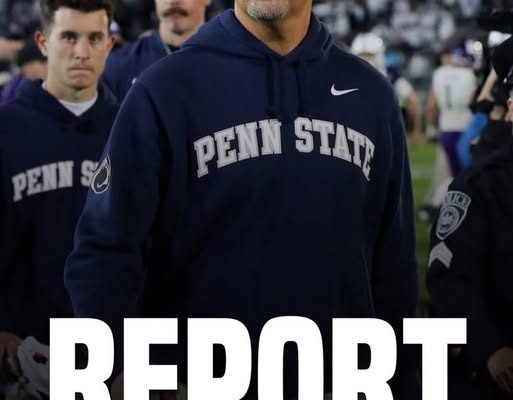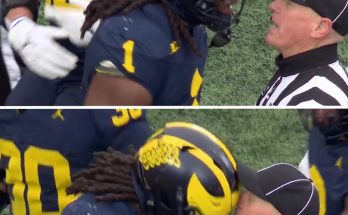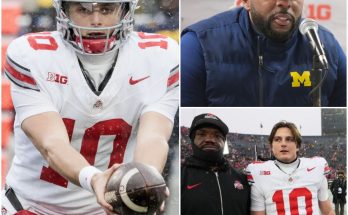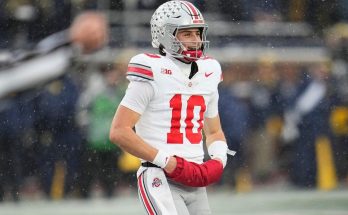Penn State’s contract with head football coach James Franklin has long been one of the most closely watched agreements in college sports. With every extension and renegotiation, fans, analysts, and insiders look for the fine print — those key clauses that reveal just how much leverage, trust, and commitment truly exists between the university and the man leading one of college football’s most storied programs. The latest revelation surrounding Franklin’s contract adds a fascinating layer of complexity and accountability: if he ever leaves his post, whether by resignation or termination, Franklin is required to seek new employment — either in coaching or broadcasting — and Penn State is obligated to pay only the difference between his new salary and what he would have earned under his old deal.
In an era when buyouts and golden parachutes dominate headlines, this clause stands out. It places an unusual, yet pragmatic condition on Franklin’s financial safety net. Rather than guaranteeing him an unqualified payout, the contract insists that he remain active in his profession, ensuring that Penn State isn’t compensating him to simply sit on the sidelines. This clause, while not entirely unheard of in high-level coaching contracts, reflects a shift in how major athletic programs handle financial risk, especially when dealing with long-term deals that can run into tens of millions of dollars.
For Franklin, whose tenure at Penn State has been marked by both success and scrutiny, the provision is both a reflection of his value and a reminder of the business realities that underpin modern college football. He is one of the highest-paid coaches in the Big Ten, a figure whose compensation package has been justified by consistent bowl appearances, competitive recruiting classes, and the restoration of the program’s national relevance following its turbulent post-sanction years. Yet, as Penn State’s ambitions grow — measured against the likes of Michigan, Ohio State, and the elite of the SEC — so too does the need for accountability on both sides of the contract.
At its core, the clause functions as a form of mitigation — a legal safeguard ensuring that Franklin’s potential departure doesn’t burden Penn State with an unnecessary financial drain. Should Franklin be dismissed without cause, or even choose to leave for another position under certain conditions, he would still have the ability to earn a substantial income elsewhere. But the university’s financial responsibility would be reduced by whatever he earns in his next role, be it on the sideline or in the broadcast booth. In essence, Penn State would only be covering the gap between what he was making in State College and what he makes next.
This structure mirrors a growing trend across major athletic programs: balancing loyalty and flexibility. Universities are realizing that while elite coaches deserve financial security, indefinite payouts are becoming increasingly untenable. Programs that once freely handed out massive buyouts now insert “duty-to-mitigate” provisions to prevent paying millions to a coach who quickly lands another high-paying gig. These clauses are standard in some professional sports contracts but have become more common in collegiate athletics as universities seek fiscal responsibility amid skyrocketing coaching salaries.
For Franklin, the implications are clear. His reputation and résumé ensure that, should he ever leave Penn State, he will almost certainly find employment quickly. Whether at another major program or as an analyst for one of the major sports networks, opportunities would be plentiful. The clause essentially ensures that the university’s obligation to him does not turn into a windfall, but rather a fair and balanced arrangement aligned with his future income.
It also reinforces a subtle but important expectation: that coaches, even after departure, remain engaged in their craft. For someone like Franklin, known for his energy, adaptability, and deep passion for football, that’s hardly a burden. The clause essentially assumes he will continue to work — a reflection of his professional identity as much as a contractual safeguard.
This kind of provision is particularly interesting when contrasted with the buyouts seen elsewhere in the college football landscape. Coaches like Jimbo Fisher at Texas A&M or Mel Tucker at Michigan State (before his firing for cause) were associated with massive guaranteed sums that their universities had to absorb after parting ways. Texas A&M’s buyout for Fisher, which at one point stood near $77 million, became a cautionary tale about the risks of long-term deals without protective clauses. In Franklin’s case, Penn State appears to have struck a balance — offering him competitive compensation while protecting the university’s financial stability.
It’s also worth noting that Franklin’s contract history with Penn State reflects an evolving relationship built on mutual dependence. When he arrived in 2014, he inherited a program still emerging from NCAA sanctions and reputational damage. Over the years, he not only stabilized the Nittany Lions but helped return them to national prominence, highlighted by the 2016 Big Ten Championship and several high-profile bowl appearances. His success on the field has earned him extensions and pay raises, but with each new deal, Penn State’s administration has fine-tuned the terms to ensure the university’s interests are safeguarded.
The inclusion of the “mitigation clause” could be seen as a pragmatic recognition of the realities of modern college athletics. Gone are the days when a coach’s departure meant automatic, unconditional payouts. Instead, contracts now reflect performance metrics, ethical clauses, and financial offsets that protect institutions while still rewarding excellence. In this sense, Franklin’s contract is emblematic of a broader shift toward balance — ensuring that loyalty is rewarded, but accountability is never removed.
There’s also an underlying philosophical element here about the evolving nature of coaching security. For years, the narrative in college football has revolved around coaches being “set for life” once they sign lucrative multi-year deals. Buyouts became a kind of financial armor, insulating them from the volatility of results-driven expectations. But the tide has started to turn. Universities, often under public and alumni pressure to manage budgets responsibly, have begun inserting language that ensures that compensation remains tied to effort, even post-departure.
For Penn State, this approach is doubly important given the university’s stature and the expectations surrounding its football program. The Nittany Lions aren’t just a team; they’re a cultural cornerstone and financial engine for the university. Every contract negotiation involving the head coach carries both symbolic and practical weight. By insisting on a clause that requires Franklin to remain professionally active to continue receiving payments, the university demonstrates a commitment to both fairness and responsibility — protecting its resources while acknowledging the realities of a high-stakes sport.
For Franklin himself, this could even serve as motivation. Coaches often thrive under structures that demand results and accountability. Knowing that his future earnings, even in the event of departure, would depend on continued engagement in the profession reinforces a mindset of continuous growth. It signals that his value, both to Penn State and to the broader football community, is measured not just in wins, but in his enduring contribution to the game.
The broadcasting component of the clause also adds an intriguing dimension. Many former coaches have seamlessly transitioned into media roles — from Urban Meyer to Les Miles and even Nick Saban, who recently joined ESPN’s “College GameDay.” The inclusion of broadcasting as a valid post-Penn State employment option acknowledges the modern reality that coaching acumen translates well into television analysis. Should Franklin ever choose that path, his natural charisma and strategic insight could make him a strong fit for the media world, while ensuring that Penn State’s financial obligations remain limited.
Ultimately, this contract clause is a snapshot of where college football is headed — toward smarter, more sustainable financial management and a greater emphasis on mutual responsibility. It’s not punitive, but protective; not restrictive, but realistic. It respects Franklin’s accomplishments and marketability while safeguarding the university’s future.
In the grander picture, it also underscores how much the business side of college football has evolved. With television deals, NIL dynamics, and conference realignments reshaping the sport’s landscape, universities can no longer afford to make emotionally driven financial commitments. Every dollar counts, and every clause must serve a purpose. For Penn State, that purpose is clear: reward excellence, but ensure accountability.
James Franklin’s legacy at Penn State continues to unfold. He remains a pivotal figure in the Big Ten and a respected voice in college football’s national conversation. His leadership, energy, and recruiting prowess have kept the Nittany Lions competitive, and his commitment to the program is evident in his words and actions. Yet, this contract clause reminds everyone — from the fans to the boosters to Franklin himself — that even the most successful partnerships must operate within the framework of mutual responsibility.
If Franklin stays, as he has repeatedly said he intends to, the clause may never come into play. But its existence speaks volumes about the maturing professionalism of college athletics. It’s a contract designed not just for the present, but for the unpredictable future — a future where even the biggest names must balance passion with pragmatism.
In the end, the revelation about Franklin’s contract isn’t just about dollars and cents. It’s about principle — the principle that success and security go hand in hand, but accountability remains non-negotiable. For Penn State and James Franklin, that balance might just be the secret to sustained success in an ever-changing game.



